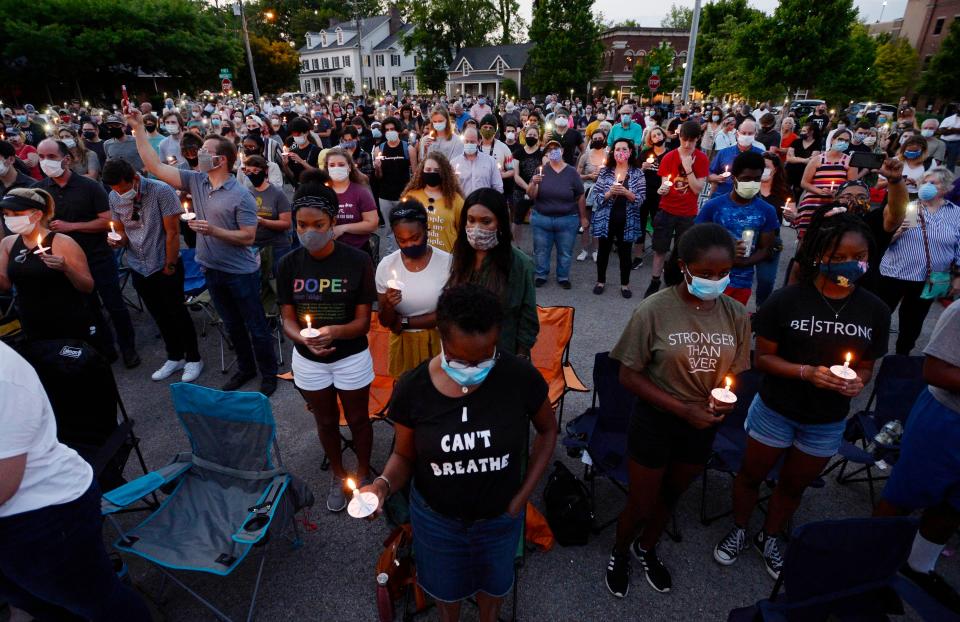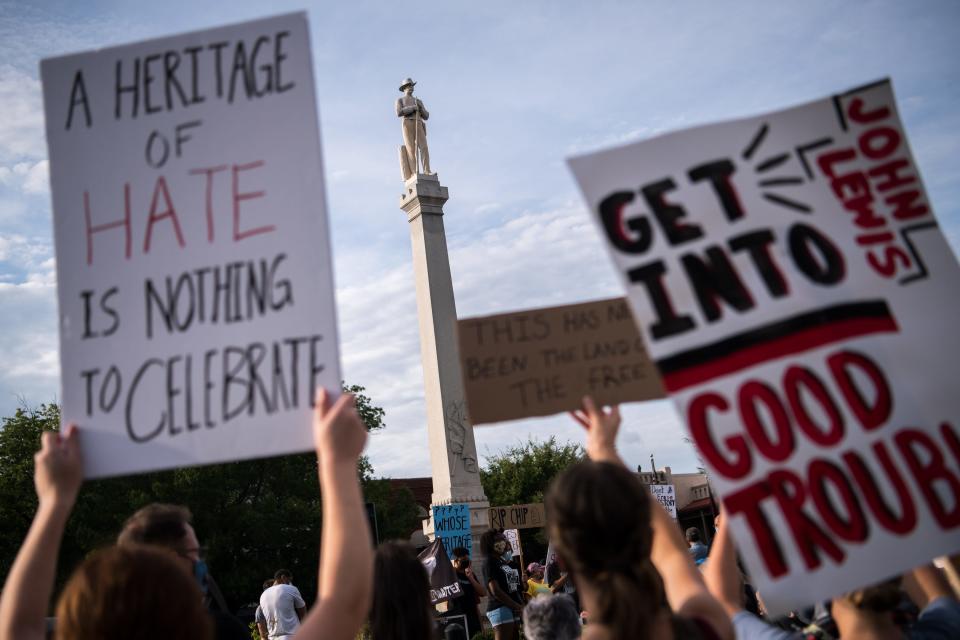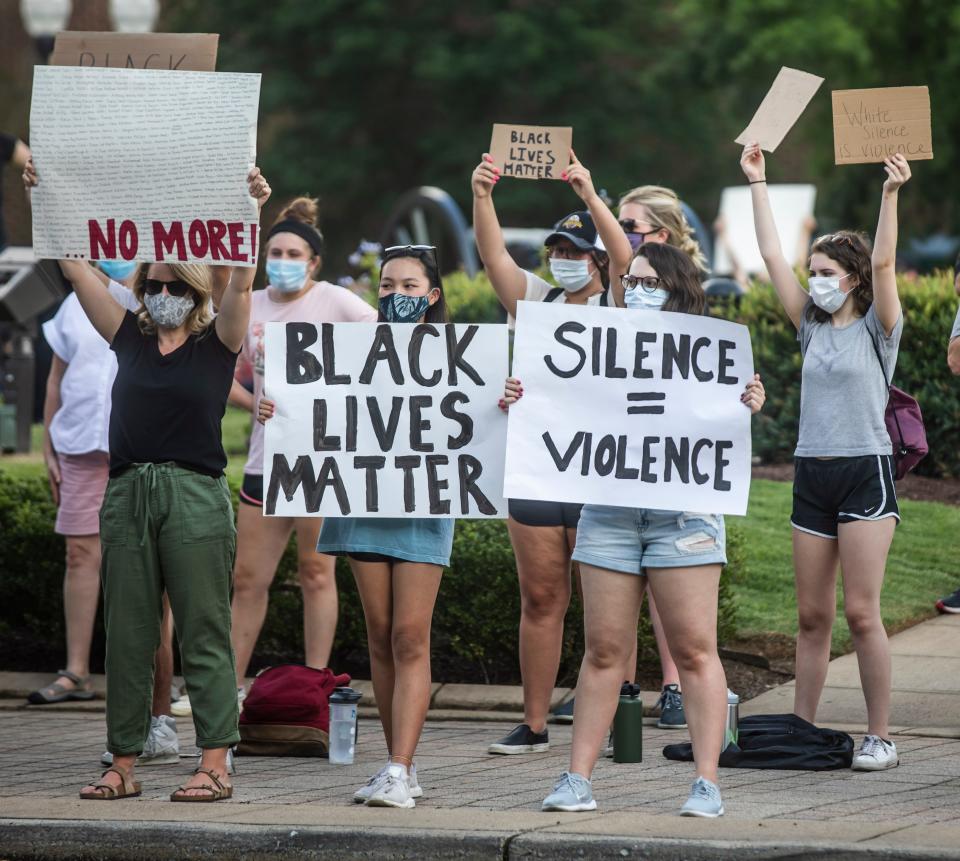Franklin leaders consider changes to protest permit rules that could ban nighttime protests
Franklin residents have held a variety of downtown demonstrations over the years, with different groups raising their voices to oppose tax hikes, support immigrant rights and show solidarity with victims of racial inequality through vigils and protests.
In April, they held signs at the city square to protest a controversial Brownland Farms development proposal ahead of a Board of Mayor and Aldermen meeting. Aldermen unanimously rejected that proposal — several officials cited public outcry as the reason.
Fast forward to June 14. Franklin aldermen discussed revising city ordinances, a move which would affect when, where and how people hold demonstrations downtown and throughout the city.

"We as the city have the ability to navigate and to manage time, place and manner that those demonstrations happen," said city administrator Eric Stuckey. "Never, ever, ever what is said."
From 2020: 'Chip has to go': Protesters want Confederate monument removed in Franklin
Previously: Franklin comes out in the hundreds for End White Silence rally
The biggest proposed changes: No protests after sunset; no weekend protests; and leave the bullhorns, loudspeakers, etc. at home.
The proposed changes would update a 2020 city ordinance.
At a work session, Stuckey and city attorney Shauna Billingsley presented the Board of Mayor and Aldermen with proposed changes, plans they said were based on feedback from residents and demonstrating groups.
The proposals are preliminary and have not been put up for a vote. The proposed rule changes are:
No permits issued for events held after dark anywhere in the city
No permits issued for events held from 5 p.m. on Friday until 9 a.m. Monday in the historic district, which encompasses the downtown core
Permits required for events of any size that use amplification such as bullhorns or loudspeakers
Permits required for events held more than once a month in the same location regardless of size
The changes would also specify that anyone violating the rules on public gatherings and expression events would be cited with a misdemeanor for public nuisance. Previously, only those who refused to comply with a permit revocation order could be charged with a misdemeanor.
Franklin's current public demonstration regulations
Franklin's current code requires permits for public demonstrations larger than 20 participants, or if street closures are required. Permit applications must be filed at least 48 hours before the event, and city officials must respond within 24 hours of receipt. If the permit is issued, city officials may designate an area for counter-protesters so opposing groups do not mingle.
The exception, Billingsley reiterated on June 14, is for protests that happen as an immediate reaction to an event or news, including same-day demonstrations.
The city is only allowed to deny permit requests if another event is permitted at the same site or if police and fire employees are needed at another permitted event.
Stuckey said the current system has worked well since it was adopted in 2020. There were 11 permitted demonstrations that year, 10 events in 2021 and so far, six in 2022. The city, he added, has only denied a permit once: when a single individual requested a 2021 permit to close a road during Pilgrimage Festival to protest traffic.

"We saw (permit rules) as a way to facilitate the exercise of first amendment rights and do it in a way that maximizes safety and the ability to be heard," Stuckey said. "By and large, it's worked pretty well."
Baggett, Burger weigh in on banning nighttime, weekend protests
The permitting system was first proposed in 2019 following large white supremacist rallies in Charlottesville, Va., and nearby Shelbyville. It was put up for a final vote in October 2020, as U.S. cities experienced Black Lives Matter protests following the deaths of George Floyd and Breonna Taylor.
The original rules passed on a 5-4 vote, a rare split vote for the board.
At the meeting, Aldermen offered feedback during the work session. Patrick Baggett, who represents much of the downtown area, said he wanted to allow for weekend demonstrations since many residents cannot attend protests or events during weekdays. Bev Burger, who voted against the original rules in 2020, said she didn't want to prevent protesters from demonstrating during high traffic times, such as Sunday mornings after church.
See photos: Nashville March for Our Lives Protest
Previously: Protesters demand a more livable wage at Dollar General corporate meeting
"That's where you want to be, where the people are," Burger said. "It's rare. I don't think that's going to be a huge problem. It's not going to be every week."
Billingsley indicated that the rules can be rewritten to address those concerns.
Jason Reineke, a journalism professor at Middle Tennessee State University, said there are still some concerns that aldermen did not address. He said restricting nighttime protests may be too vague.

"If 'after dark' means different things for different groups engaging in public gathering or expression events, that would be a problem," Reineke said. "There's a potential for unequal treatment under the law created by the phrase 'after dark.'"
Cole Villena covers Williamson County at The Tennessean, part of the USA Today Network — Tennessee. Reach Cole at cvillena@tennessean.com or 615-925-0493. Follow Cole on Twitter at @ColeVillena and on Instagram at @CVinTennessee.
This article originally appeared on Nashville Tennessean: Franklin considering rule changes on public demonstrations, protests

